Zotero is a fabulous tool for managing research material.1 The word processor integration makes it easy to insert citations on the fly as you write.
But the citations you insert will only be as good as the information in your Zotero library. So, if some of that’s incorrect or mis-formatted, Zotero will reflect those problems in the citations it creates.
Zotero makes it easy to correct information about any item in your library. But what happens if you need to change many items?
Fortunately, it’s quite easy to change many items all at once. So, there’s no need to make the same change to each of them individually.
1. Set up Zutilo.
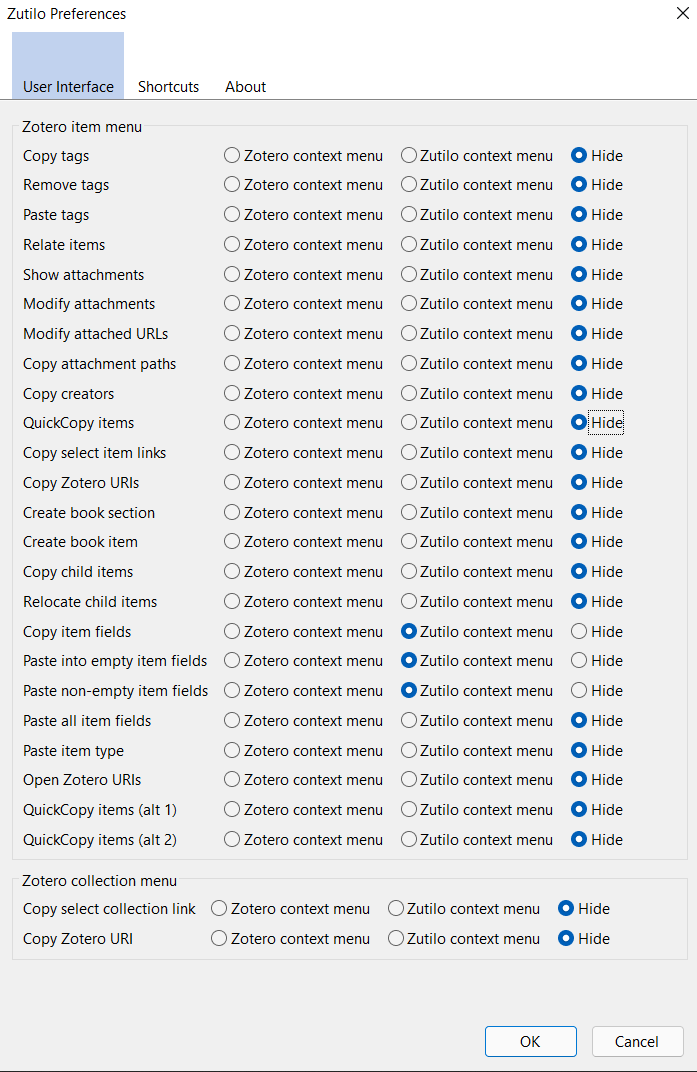
To bulk edit multiple items in Zotero, you’ll need to install the latest version of the Zutilo extension.2 Once you have Zutilo installed in Zotero, go to Tools > Zutilo Preferences ….
From there, you’ll notice Zutilo can do a number of things and make several changes to your Zotero interface. To start bulk editing Zotero items, however, it might be simplest to disable all the options on the Zutilo User Interface tab except for
- Copy item fields,
- Paste into empty item fields, and
- Paste into non-empty item fields.
For these items, choose to display them either in the Zotero context menu (i.e., the right- or command-click menu) or in a Zutilo-specific flyout from that menu.
Click OK, and you’ll have Zutilo ready to go.
2. Collect the items you need to edit.
Next, if you haven’t done so already, collect into one place all of the items you need to edit. You can do this by creating a saved search in Zotero based on the item metadata that you want to edit.3
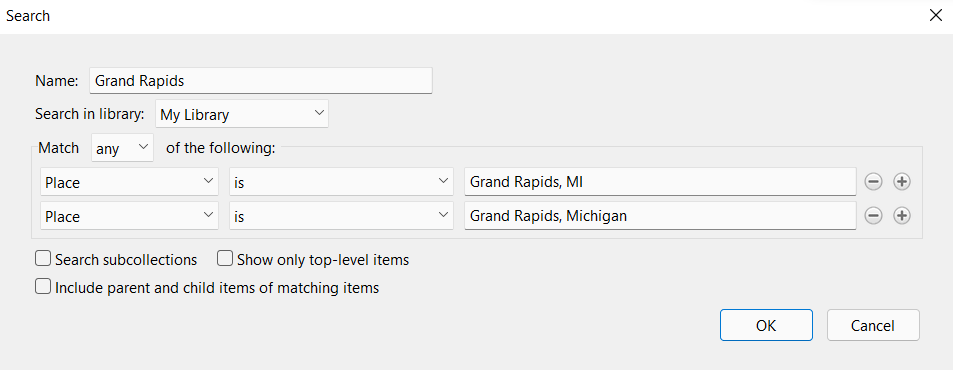
For instance, if you’re using SBL style, “Grand Rapids” is a “well known” place of publication.4 Consequently, it shouldn’t be accompanied by a state name or abbreviation.
So, if you had some entries in your library with this additional information, you might create a saved search to group them all together for easy editing.
3. Use information from an existing item as a template.
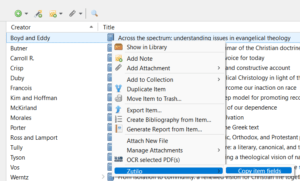
For one of the items in this saved search, you’d open the context menu, and use Zutilo to copy the fields for that item.
Then, open a plain text file, and paste in the item fields that you copied. This will give you a long string of what might, at first, look like unreadable code gobbledygook. But if you look closely, especially at the beginning of what you pasted, you should notice how some of what shows up in that item’s record as you look at in Zotero appears pretty transparently in what you’ve pasted into your text editor.
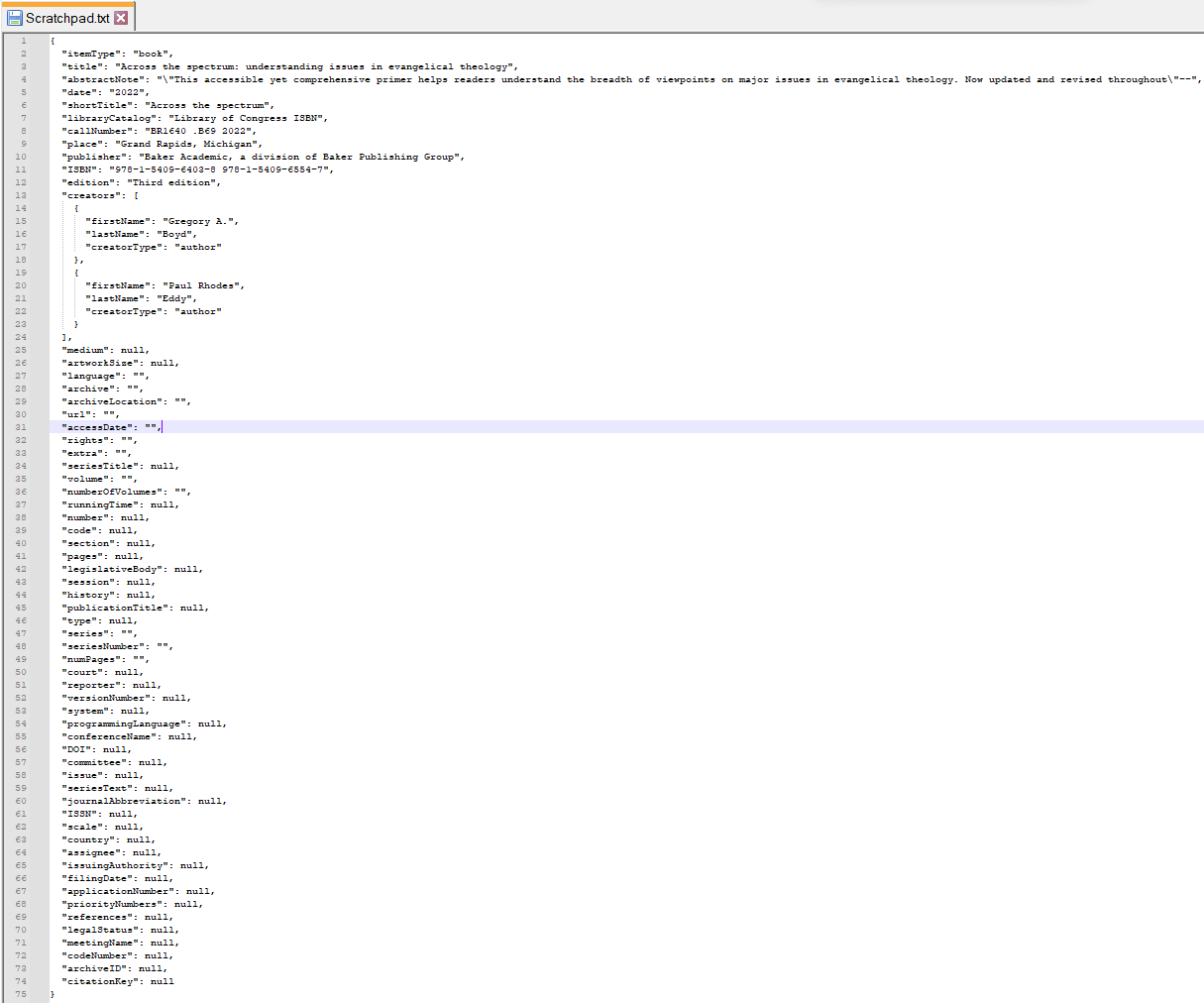
In the text editor, be sure to leave
- the opening
{, - the line with
"itemType":, - any other lines for fields you want to use in your bulk edit,
- and the closing
}.
But delete the other lines. In this example, I’m bulk editing only the place of publication. So, the code gobbledygook above simplifies down to just the following:
{
"itemType": "book",
"place": "Grand Rapids, Michigan",
}From this point, you need to make two changes. These are to
- change
Grand Rapids, Michiganto justGrand Rapids, which is what you want the place name to be for all the relevant items in Zotero, and - delete the comma before the closing
}.
Your text file will then look as follows:
{
"itemType": "book",
"place": "Grand Rapids"
}4. Bulk edit the items in your saved search.
From this point, copy this content from your text file back onto your clipboard, and return to Zotero. Select all the records you want to update (i.e., all the records in your saved search), and open the context menu.
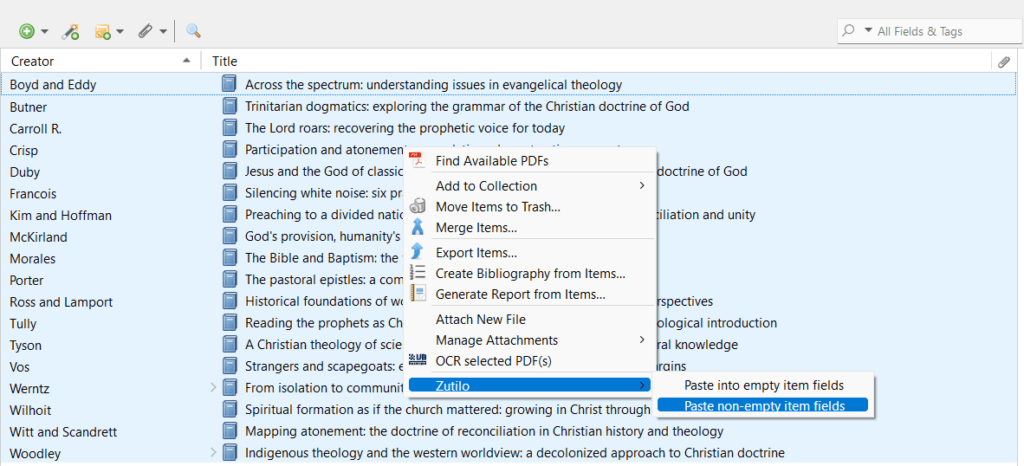
In this example, there aren’t any empty fields to fill. So, you’ll select “Paste non-empty item fields.”
It may take Zotero a few seconds to process the changes depending on how many you’re making and how many records are involved. But once Zotero finishes, you should see an empty saved search folder.
The folder will be empty because you’ve updated all the records it contained. Now, none of those records matches the search criteria. All of them now have “Grand Rapids” and not “Grand Rapids, MI” or “Grand Rapids, Michigan.”
You can then delete your saved search folder and enjoy the benefits of cleaner citations from a tidier Zotero database without the time and tedium of having needed to edit each record manually.
Conclusion
Zotero’s a wonderful tool. And the various ways of getting bibliographic data into it make entering new items into your library incredibly easy.
But there’s also no accounting for the quality of the data that you’ll initially import into Zotero from whatever sources. And as the saying goes, “garbage in, garbage out.”
Fortunately, Zutilo makes it very easy to quickly correct data in multiple Zotero records, leaving you with less work to do in managing your materials and more time to focus on your research and writing.
Header image provided by NordWood Themes. ↩
For this resource and the fundamentals of the process described here, see “Editing Multiple Items at Once,” Zotero Forums, n.d. ↩
For information about searching and saving searches in Zotero, see Zotero, “Searching,” Zotero, 30 January 2022. ↩
Society of Biblical Literature, The SBL Handbook of Style, 2nd ed. (affiliate disclosure; Atlanta: SBL, 2014), §6.1.4.1. ↩

Leave a Reply